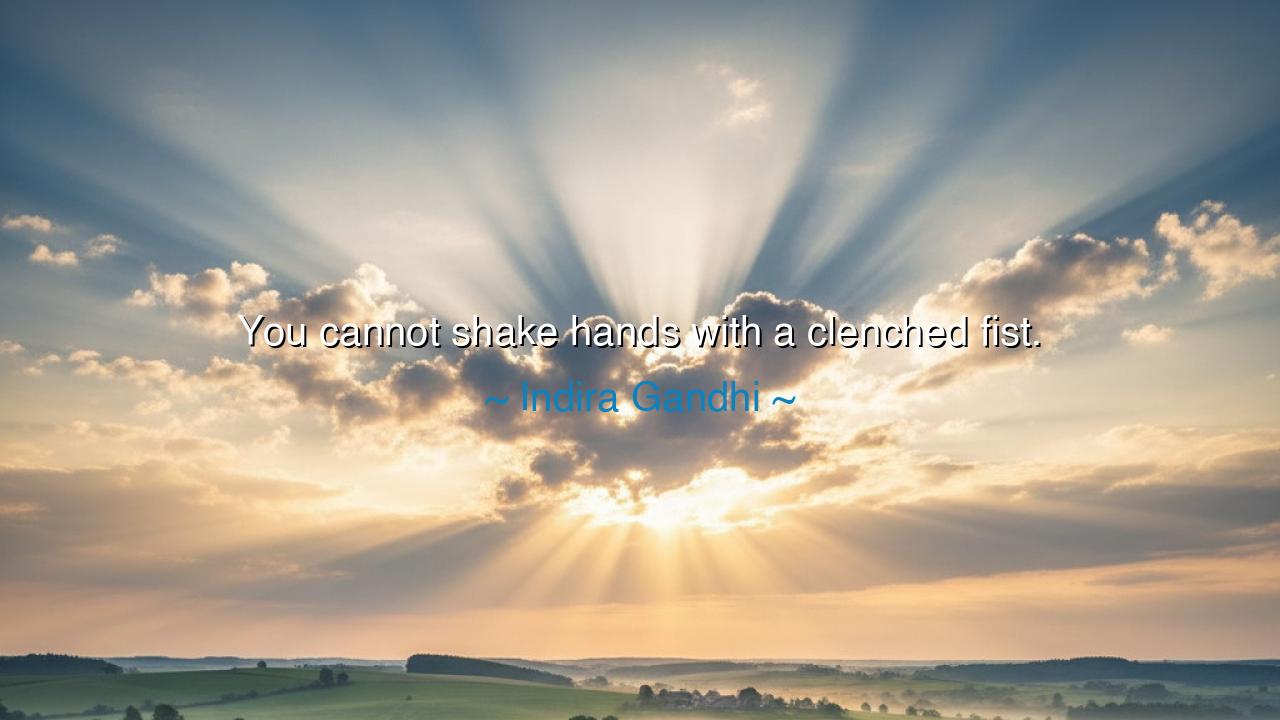
You cannot shake hands with a clenched fist.






In the echoes of history, wisdom often comes not from conquerors with swords, but from leaders who sought peace with courage. So spoke Indira Gandhi, daughter of India and voice of her people: “You cannot shake hands with a clenched fist.” Her words resound like the tolling of a great bell, reminding us that reconciliation is impossible when hearts remain hardened, when anger is tightly gripped, and when hands that might embrace are instead closed for striking.
The clenched fist is a symbol of defiance, of conflict, of the unwillingness to yield. It is the gesture of a man ready for battle, of a nation unwilling to bend, of a soul too proud to forgive. Yet, as Gandhi teaches, one cannot form a handshake—that sacred seal of friendship and trust—until the fist is opened, until the spirit releases its wrath and extends itself to another. The power of her saying lies in its simplicity: peace requires not strength of muscle, but humility of heart.
Consider the tale of Nelson Mandela, who, after decades of chains and exile, emerged from prison not with vengeance in his heart, but with an open hand. South Africa was a nation ready to tear itself apart, fists clenched on both sides of its racial divide. Mandela knew that if he answered hatred with hatred, the land would be consumed in fire. Instead, he reached out his hand to his former enemies, offering dialogue, offering peace. His open hand transformed the course of a nation, proving Gandhi’s wisdom in living form.
The ancients, too, understood this. In the Iliad, when Achilles’ wrath consumed him, no reconciliation was possible, and countless lives perished. Yet when Priam, king of Troy, came to him humbly, kissed the hand that had slain his son, Achilles at last unclenched his fist. The two wept together—foes, yet also fathers and men. In that moment, the fury that had devastated nations was stilled, if only for a time. So it is with us: only when we release our grip on rage can we touch another soul in peace.
Gandhi’s words are not only for kings and leaders, but for every heart that has ever felt wronged. In our homes, in our friendships, in our workplaces, we too form clenched fists when we cling to pride, when we refuse forgiveness, when we demand victory instead of understanding. But so long as the fist remains closed, the bridge of reconciliation cannot be built. The open hand is a risk—it may be rejected, it may even be struck—but without it, there can never be trust, never healing, never unity.
What, then, must we do? We must learn the discipline of opening the hand. When anger surges, breathe and loosen your grip. When pride stiffens your heart, remember that no man is diminished by forgiveness, but exalted by it. When you are tempted to repay harm with harm, choose instead to extend a hand in peace. This is not weakness but the highest strength, for it requires mastery of the self.
Practically, this means speaking when silence would fester, apologizing when fault is yours, and even when fault is not, seeking to understand before demanding to be understood. It means remembering, in moments of conflict, that the goal is not victory over another, but harmony with another. Let your hands build, not break; let them unite, not divide.
Thus, Indira Gandhi’s teaching becomes eternal: a nation, a people, a family, an individual cannot find peace until the fist unclenches into the handshake. The hand that once struck must learn to heal; the hand that once clutched in anger must learn to release. For only in opening the hand do we open the heart, and only then can true peace enter in.






AAdministratorAdministrator
Welcome, honored guests. Please leave a comment, we will respond soon